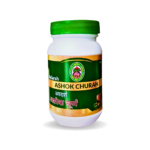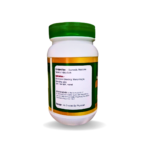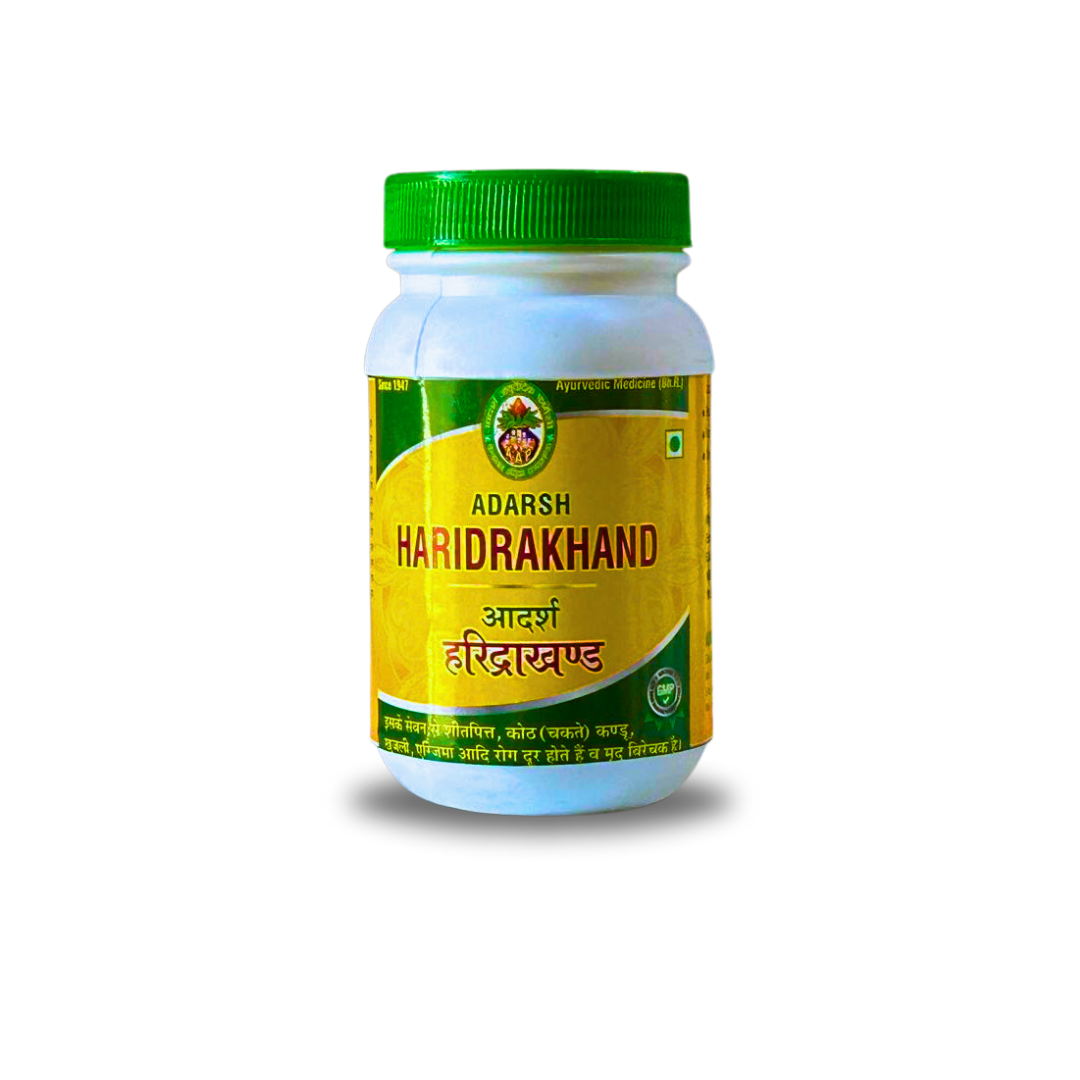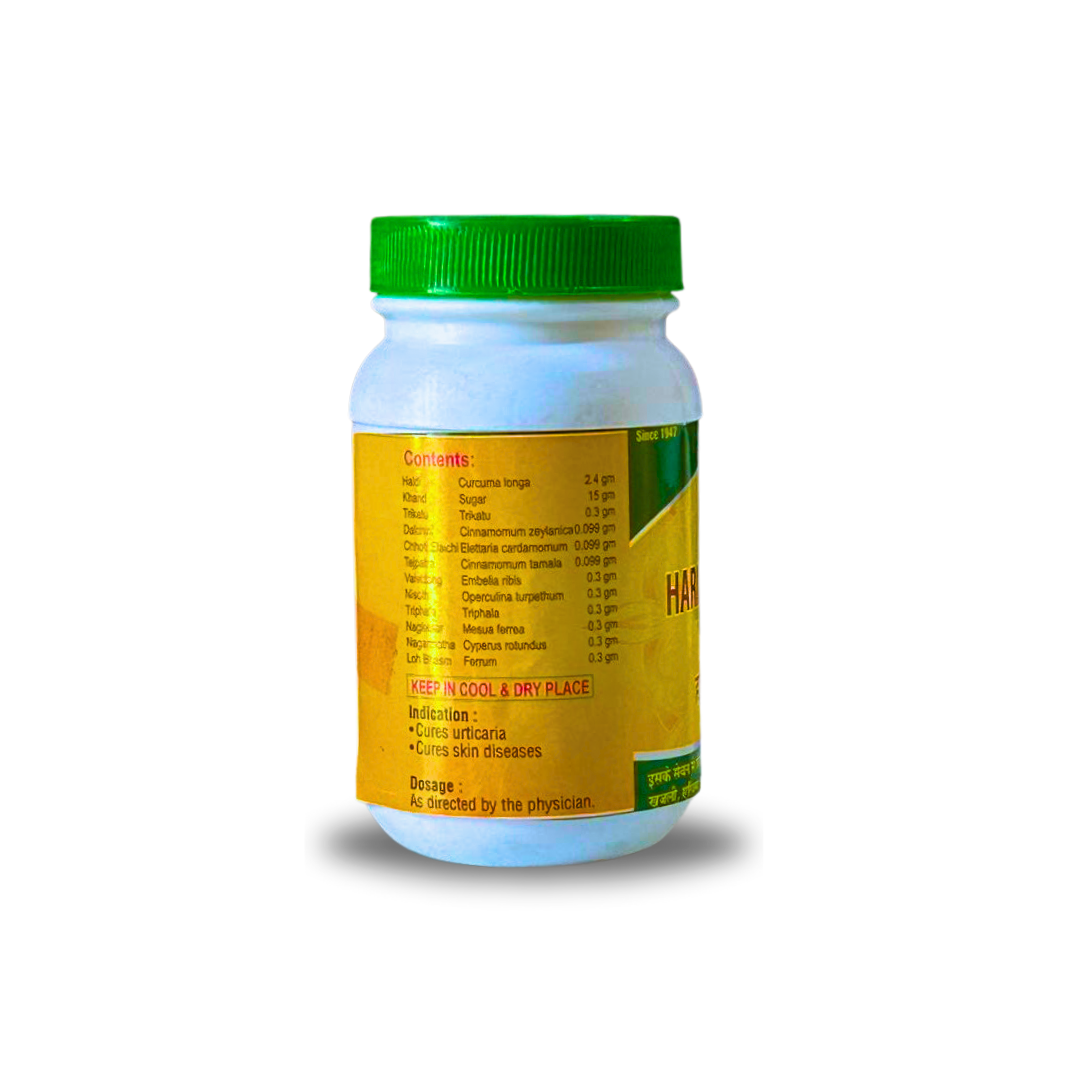Ashok Churan
₹100
Ashok, also known as Saraca indica, is an Ayurvedic herb derived from the bark of the Saraca indica tree. The bark of this tree is used for medicinal purposes in Ayurveda.
According to the Ayurvedic Medicine book, Ashok bark is traditionally used to treat various health conditions such as excessive bleeding, menorrhagia (heavy menstrual bleeding), and bleeding piles (hemorrhoids).
Ashok bark is believed to have astringent and uterine tonic properties that may help reduce bleeding and tone the uterus. It is commonly used in Ayurvedic medicine as a natural remedy for various gynecological disorders, including those mentioned above.
- Delivery & Return
Delivery
We ship to all over the world. All orders are shipped with a UPS tracking number. Always free shipping for orders over 1000. During sale periods and promotions the delivery time may be longer than normal.Return
Adarsh Ayurvedic Pharmacy will accept exchanges and returns of undamaged box within 30 days of the date of purchase (14 days during the sales period), on presentation of the original till receipt at any store where the corresponding collection is available within the country of purchase. Your return will usually be processed within a week to a week and a half. We’ll send you a Return Notification email to notify you once the return has been completed. Please allow 1-3 business days for refunds to be received to the original form of payment once the return has been processed.Help
Give us a shout if you have any other questions and/or concerns. Email: aapdeepak.hdr@gmail.com Phone: 9897902760
Ashok, also known as Saraca indica, is an Ayurvedic herb derived from the bark of the Saraca indica tree. The bark of this tree is used for medicinal purposes in Ayurveda.
According to the Ayurvedic Medicine book, Ashok bark is traditionally used to treat various health conditions such as excessive bleeding, menorrhagia (heavy menstrual bleeding), and bleeding piles (hemorrhoids).
Ashok bark is believed to have astringent and uterine tonic properties that may help reduce bleeding and tone the uterus. It is commonly used in Ayurvedic medicine as a natural remedy for various gynecological disorders, including those mentioned above.
However, it is important to note that herbal remedies should be used under the guidance of a qualified Ayurvedic practitioner. They can recommend the appropriate dosage and duration of treatment based on individual needs and health conditions. It is also important to seek medical attention if the bleeding is severe or persistent.
Ashok bark is believed to have astringent and uterine tonic properties that may help reduce bleeding and tone the uterus. It is commonly used in Ayurvedic medicine as a natural remedy for various gynecological disorders, including those mentioned above.
Buy 10 get one free.
Selflife: 3 Years
| Weight | 250 g |
|---|---|
| Dimensions | 14 × 12.5 × 8.5 cm |
| Weight | 100gm |
Based on 0 reviews
|
|
|
0% |
|
|
|
0% |
|
|
|
0% |
|
|
|
0% |
|
|
|
0% |
Only logged in customers who have purchased this product may leave a review.
Related Products
Eladi Vati is typically taken orally, and the recommended dosage and duration of use may vary depending on the individual’s condition and overall health. It is important to consult with a qualified Ayurvedic practitioner before using this or any other herbal remedy.
Although Eladi Vati is generally considered safe when taken as directed, some individuals may experience side effects such as stomach upset, allergic reactions, or interactions with other medications. It is important to speak with a healthcare provider before using this or any other herbal remedy, especially if you are pregnant, breastfeeding, or have any underlying health conditions.
Out of stock
The components of Adarsh Tamrakalpam is enriched to cure all types of hepatitis.
Adarsh Tamrakalpam has curative results in liver diseases.
Adarsh Tamrakalpam cures pitta dosha stomach aches and ulcer
Dr. Deepak suggests Adarsh Tamrakalpam is many folds effective if consumed with Adarsh Mednasak Godan vati. The combination also detoxifies the liver and cures Splenomegaly and hepatitis.
Buy 10 get one free.
Selflife: three years.
“Arogyavardhini” is an Ayurvedic herbal formulation that is traditionally used to promote overall health and well-being. It is believed to help support liver function, improve digestion, and boost the immune system.
The ingredients of Arogyavardhini of this specific formulation typically includes a combination of herbs and minerals such as triphala (a blend of three fruits), kutki (a bitter herb), guggulu (a resin), shilajit (a mineral pitch), Abarak bhasam , Loh Bhasam and others.
The unique formulation of Adarsh Aroghyavardhni has potency to burn fat and purify blood .
As with any herbal supplement, it is important to consult with a healthcare professional before taking Arogyavardhini, especially if you have any pre-existing medical conditions or are taking any medications.
Key Component:
1. Triphala: A blend of three fruits – amla, haritaki, and bibhitaki – that are known for their antioxidant and anti-inflammatory properties. Triphala is commonly used in Ayurveda to support digestion and overall health.
2. Kutki: A bitter herb that is commonly used in Ayurveda to support liver health and improve digestion. Kutki is believed to have anti-inflammatory, antiviral, and antioxidant properties.
Vrihat Vat Chintamani Ras (also spelled as Vihrit Vat Chintamani Ras) is a traditional Ayurvedic medicine that is used to treat various conditions related to the nervous system, including paralysis, facial palsy, hemiplegia, and sciatica. It is typically made from a combination of minerals such as purified mercury, sulfur, and mica, along with herbs like ginger, long pepper, and black pepper.
However, it’s important to note that the use of Ayurvedic medicines should be done under the guidance of a qualified Ayurvedic practitioner, as they can be potentially harmful if not used properly. Additionally, the safety and efficacy of these medicines have not been evaluated by the FDA, so caution should be exercised when using them.
Haridrakhand (also spelled as Haridra Khanda) is an Ayurvedic herbal formulation that is commonly used in traditional Indian medicine. It is a powdered mixture of various herbs and spices, with turmeric (haridra in Sanskrit) being the primary ingredient.
Some of the key ingredients in Haridrakhand include turmeric, ginger, black pepper, cardamom, cinnamon, and honey. These ingredients are believed to have a range of health benefits, such as reducing inflammation, improving digestion, boosting the immune system, and promoting healthy skin.
Amalaki Rasayana is an Ayurvedic herbal formula made from the fruit of the Amalaki tree (Emblica Officinalis), also known as Indian Gooseberry. It is believed to have a rejuvenating effect on the body and is commonly used to promote overall health and well-being.
According to Ayurveda, Amalaki Rasayana is classified as a “Rasayana,” which means it is a rejuvenative tonic for the body and mind. It is also believed to have a powerful antioxidant effect, which helps to protect the body from free radical damage.
Dashmool Kwath is an Ayurvedic herbal decoction made from a blend of ten herbs, which include Bilva (Aegle marmelos), Agnimantha (Premna integrifolia), and Shyonaka (Oroxylum indicum). The name Dashmool means ‘ten roots’ or ‘ten herbs,’ and the combination of these herbs is believed to have a synergistic effect and offer a wide range of potential health benefits.
According to Ayurvedic principles, Dashmool Kwath is believed to help balance the three doshas – Vata, Pitta, and Kapha, and promote overall health and well-being. It is commonly used to support the respiratory system, improve digestion, and relieve stress and anxiety.
Chandanbala Lakshadi Tail is typically applied topically to the affected joint areas and gently massaged into the skin. The frequency and duration of use can vary based on individual needs and the guidance of a qualified healthcare professional. It is important to note that like all herbal remedies, Chandanbala Lakshadi Tail may cause allergic reactions or other side effects in some individuals, and should be used with caution.
Chandanbala Lakshadi Tail is an Ayurvedic herbal oil made from a blend of several herbs, including Chandan (Sandalwood), Bala (Sida cordifolia), and Laksha (Laccifer lacca). The oil is commonly used in Ayurvedic medicine to help relieve joint pain and inflammation.
Pathyadi Kwath is an Ayurvedic herbal decoction made from a blend of several herbs, including Haritaki (Terminalia chebula), Bibhitaki (Terminalia bellirica), and Shunti (Zingiber officinale).
According to Ayurvedic principles, Pathyadi Kwath is believed to help support respiratory health, particularly in cases of cough and cold. It is also commonly used to support digestive health, promote healthy metabolism, and alleviate symptoms associated with inflammation.
Ashwagandha Ghan is typically taken orally in liquid form, and the dosage and duration of treatment may vary depending on the individual’s needs and the practitioner’s recommendations. It is important to consult with a qualified Ayurvedic practitioner before using Ashwagandha Ghan, especially if you have a history of medical conditions or are currently taking any medications. Additionally, it is important to be aware of potential side effects and contraindications before using any herbal supplement.
The primary active compounds in Ashwagandha Ghan include withanolides, alkaloids, and flavonoids, which are believed to have adaptogenic, anti-inflammatory, and antioxidant properties. Ashwagandha Ghan is commonly used in Ayurvedic medicine for reducing stress and anxiety, supporting healthy immune function, and promoting overall vitality and wellness.
Bhringraj tail is typically applied to the scalp and hair, left for a period of time (usually 30 minutes to several hours), and then washed out with shampoo. The frequency and duration of use can vary based on individual needs and the guidance of a qualified healthcare professional. It is important to note that like all herbal remedies, Bhringraj tail may cause allergic reactions or other side effects in some individuals, and should be used with caution.
Bhringraj tail is an Ayurvedic herbal oil made from Bhringraj (Eclipta alba), a plant known for its hair growth promoting properties. The oil is believed to help nourish and strengthen the hair, prevent hair loss, and promote the growth of healthy hair.
Marichiyadi Tail is typically applied topically to the affected area and gently massaged into the skin. The frequency and duration of use can vary based on individual needs and the guidance of a qualified healthcare professional. It is important to note that like all herbal remedies, Marichiyadi Tail may cause allergic reactions or other side effects in some individuals, and should be used with caution.
Marichiyadi Tail is an Ayurvedic herbal oil that is made from a blend of several herbs, including Marich (Black pepper), Ajwain (Trachyspermum ammi), and Karpura (Camphor). This oil is commonly used in Ayurvedic medicine for the treatment of joint pain, muscle pain, and stiffness.































Reviews
There are no reviews yet.